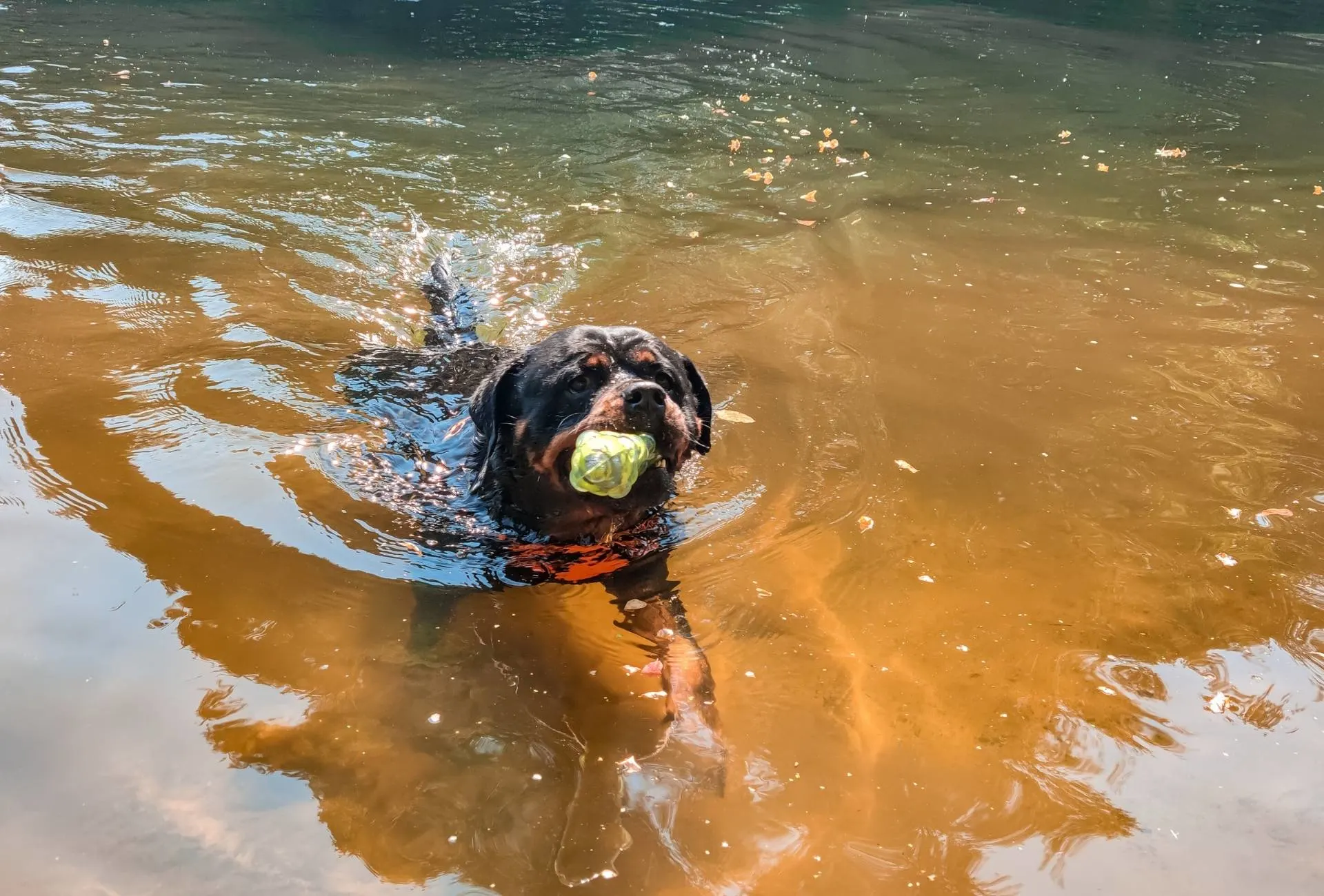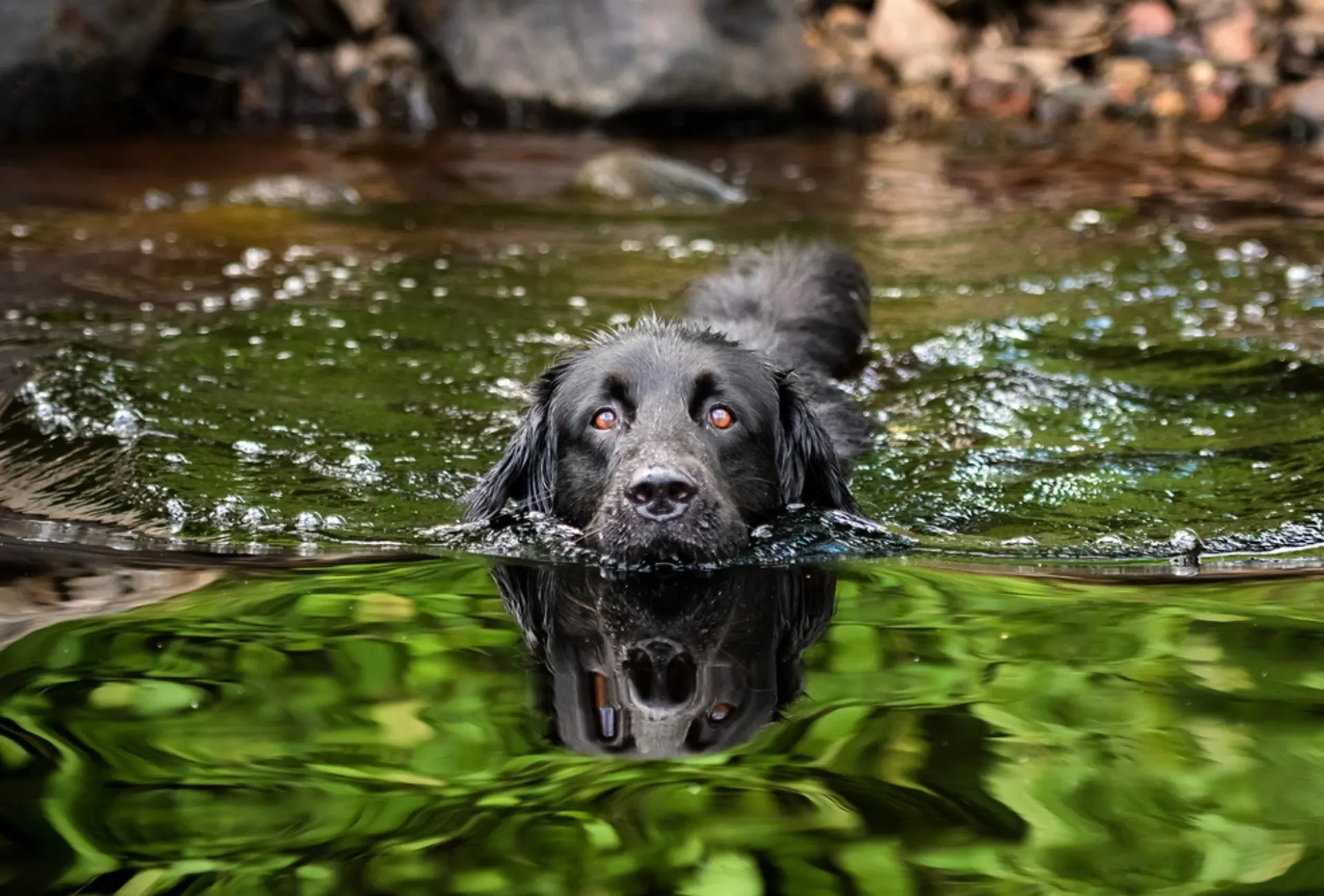Avid swimmers in the canine world are living on the edge.
And yet, many well-meaning dog owners are not aware of the dangers water can pose.
Some of you might’ve heard about dangers lurking in bacteria-infested waters or dogs drowning long after swimming (so-called dry drowning).
So it’s totally understandable that you’re worried if your dog behaves strangely after swimming.
My Rottweiler is easily excitable and that’s no different when she’s swimming.
Gulping lots of water when retrieving toys or drinking from the river on hot summer days makes her more vulnerable to the dangers water can pose.
That’s why I’ve researched what precautions to take and what to look out for after a dog’s swimming session (even, or especially, if that’s hours ago).

Standing waters can pose just as much of a health hazard as flowing waters or even pool water.
Dog Acting Weird After Swimming
Your dog may be acting weird after swimming due to swallowing water, chlorine, blue-green algae, parasites or bacteria, an ear infection, or simply exhaustion.
Some of these causes can be emergencies while others might be solved during regular vet visits or they can even be harmless.
Never take any chances though. If you suspect a serious issue, consult your vet.
Swallowing too much water, blue-green algae, or ear infections may sound harmless compared to other serious conditions, but they can be emergencies.
Weird behavior needs to be closely monitored, especially if the behavior is in stark contrast to when the day started.
Keep an eye on your dog, even if they felt a little under the weather already. It might indicate an ear infection, allergy, or a cold.
1. Dog Acts Weird After Swallowing Water
If your dog acts weird after swallowing too much water and you observe other behavioral issues or difficulty breathing, you need to call your vet.
This condition is referred to as hyponatremia or “water intoxication” and has a whole range of symptoms.
- Vomiting
- Bloating
- Lethargy
- Difficulty breathing
- Nausea
- Dilated pupils or glazed eyes
- Light gum color or salivation
This is probably the most common cause why dogs behave strangely after coming back from a swim.

Below, I’ve gone a bit more into specifics on what to do if your dog coughs a lot after inhaling loads of water.
2. Dog Swallowed Chlorine Water
Chlorine water can pose a health risk to your dog and may cause them to behave strangely due to stomach upset, but the danger depends on the dose.
This study among more than 400 dogs tried to identify the risks of swimming in chlorine water.
Dermatological issues (dry skin, coat, or abrasion at the armpits) were observed in 15-20%, followed by red eyes and ear infections.
One might assume that the dogs just didn’t swallow water while swimming under supervision.
But either way, while dipping into chlorine water usually requires no emergency vet, you need to be careful with the concentration of chlorine and how much your dog swallowed.
(…) the hazards of chlorine exposure are dose dependent. Pool water contains very dilute levels of chlorine, and is unlikely to cause chlorine poisoning in (…) animals. (…) a pet is more likely to become ill from a dunk in a standing pool of water, or a lake filled with unknown microorganisms such as amoeba, than they are from swimming in a properly maintained pool full of chlorinated water.
Jessica Vogelsang, DVM
3. Blue-Green Algae
Blue-green algae can be the cause of your dog’s weird behavior after swimming and some types are extremely toxic for dogs.
Typing “blue-green algae dogs” and checking the news tab spits out dozens of dogs who are sadly not with us anymore due to algae poisonings.
The symptoms are plentiful and some articles list nearly 20 symptoms.
As a regular dog owner, it’s essential to know the symptoms but many point toward dozens of potential issues while some are rarely noticed by laymen.
Prevention is key.
Whether it’s a lake, pond, or river, if there’s brightly colored foam, stay away.
A film of greenish slime is also a warning sign.

No drinking, no swimming. If your dog went in before you were able to recall them, wash the fur immediately and avoid letting them lick themselves.
States with flyers or info material warning against algae for pets include Wisconsin, Washington, Oregon, Texas, Michigan, and many more.
4. Parasites or Bacteria
A lake, pond, river, creek, marsh, lagoon, and many more water types have one common denominator; they can be the perfect playground for parasites and bacteria.
Given all the different types of parasites and bacteria that may affect your dog, it’s pretty shocking.
There are a few common-sense rules such as the ones above for blue-green algae (i.e. foam, slime, smell).
However, you can’t always tell if something was in the body of water your dog played in.
If your dog has swum in water that you suspect is contaminated with bacteria or parasites and then licked his fur or, worse, swallowed or drank something while swimming, consult your veterinarian.
Some of these cases can be treated with meds but the response time is crucial.
Common dangers in the water include the following:
- Giardia
- Cryptosporidium
- Leptospirosis
- Pseudomonas
- Schistosomiasis
- Pythiosis
The symptoms are not always helpful in pinpointing the disease.
While giardia and cryptosporidium usually cause diarrhea (sometimes so severe that dehydration develops), others such as leptospirosis can cause fever, shivering, vomiting, muscle tenderness, changes in urination, and more.
Did you know? The rare disease Naegleria fowleri (also dubbed the brain-eating disease) only has 200 known cases – well shy of the 200,000 it takes to qualify as “rare” – and between 1962-2021, there were four known survivors.
5. Ear Infection
Dogs can get ear infections from swimming which is often expressed by excessive head shaking or colored discharge from the ear.
If your dog behaves weirdly after swimming and you can match the symptoms with those of an ear infection, consult your vet.
All the ear infection symptoms:
- Head shaking
- Ear scratching
- Black/yellowish discharge
- Strong odor
- Inflamed ear (red and swollen)
The weird behavior after your dog was swimming may be due to the fact that your dog is in pain and trying to relieve the itchiness.
There are home remedies available to make the pain more bearable but you always need to consult your vet with ear infections.
Home remedies will not treat the bacteria and yeast that are causing the infection, and may make the problem worse.
6. Exhaustion
Dogs who behave weird after swimming may just experience the aftermath of a good workout or perhaps your dog swam past exhaustion.
Limit the swimming time to avoid exhaustion in the future.
Don’t get me wrong, swimming is great for dogs.
But if yours isn’t used to the exercise or swam a little too far out, he might just be really exhausted.
That’s often the case if well-meaning owners gleefully toss the ball far out again, and again, and again.
7. Upper Respiratory Infection
An upper respiratory infection may be responsible for your dog’s unusual behavior after swimming.
However, this is more likely if you’ve encountered other dogs while enjoying your swimming sessions.
Perhaps your dog has other signs of a respiratory infection such as sneezing, coughing, nasal or ocular discharge, lethargy, or a fever.
If you notice these symptoms in your pet, see your veterinarian right away.
8. Allergies
Never rule out allergies if your dog behaves strangely after swimming.
Luscious vegetation near lakes, creeks, and rivers means that allergies are more likely to surface.
This one’s more likely in the spring and summer months, especially if your dog is not a stranger to allergies.
Not as likely as a dog swallowing water or getting an ear infection though.
Dog Coughs After Swimming
If your dog coughs after swimming, aspiration pneumonia might be the cause and veterinary attention might be required immediately.
This danger of inhaling/swallowing water is also known as dry drowning, secondary drowning, or aspiration.
Only your vet can rule out that water has entered your dog’s lungs.
While a mild case of aspiration might go away on its own, it should never be taken lightly.
Dry drowning progresses quickly and symptoms might only develop hours after you’ve come back from the trip to the lake.
Symptoms of dry drowning include coughing, hacking, wheezing, difficulty breathing, and lethargy (due to the lack of oxygen or chest pain).
Vomiting white foam is also a possibility.
Other causes for a strong cough after swimming can include swallowing particles from the river or an irritated throat caused by chlorine, for example.
What To Do If My Dog Inhales Water
If your dog inhales water, end the swimming session and closely monitor your dog for signs of dry drowning, stomach upset, or symptoms caused by bacteria.
Dogs who behave weirdly after a swimming session may require veterinary attention.
Take measures to ensure your dog is not inhaling water in the future by not tossing balls or sticks, and by encouraging your dog to swim with the mouth closed for shorter sessions.
Dog Peeing A Lot After Swimming
Peeing a lot after swimming might be a sign that your dog drank a lot of water or was just pretty excited.
Make sure your dog stays hydrated after coming home and that the urine looks normal.
If your dog loses the ability to control his bladder or if the urine changes color, give your vet a call.
Urinating while sleeping is also possible but may indicate other medical issues instead.
Think about it like this: You swim, ride back home, drink a lot, and then have a good nap.
Accidents happen.
If it’s a complete one-off occurrence, your dog is probably okay.
Call your vet if it happens repeatedly since this may indicate an underlying medical issue.
Dog Bloated After Swimming
Bloat in general is not uncommon but usually doesn’t happen after swimming unless your dog exercises right after a meal or after drinking a lot of water.
Some breeds such as the Great Dane, Doberman, and Boxers are more prone to bloat than others.
Other factors increasing the risk of bloat are a higher weight (>99 pounds is said to increase risk by 20%), old age, and a deep-chested build.
However, the origins and causes are not fully explored and the biggest risk factor is eating or drinking right before exercising.
If you suspect bloat, or any other serious condition such as dry drowning, bacteria, or an ear infection, consult your vet.
Many of these conditions can be fixed by your vet and the examination cost, diagnostic tools, and eventual treatment with antibiotics or other meds are still cheaper than waiting just to end up in need of hospitalization or surgery.
Disclaimer: This blog post does not substitute veterinary attention and does not intend to do so. I am not a veterinarian or pet nutritionist. If your dog shows any sign of illness, call your vet.